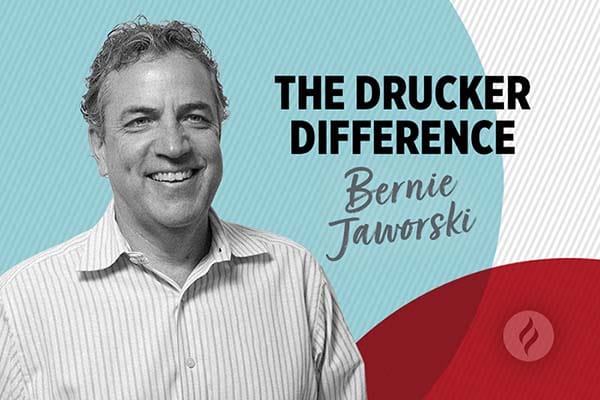The Drucker Difference: What’s Next for Knowledge Workers?

Normally, you might be reading this during a break at work. But if you’re among the tens of thousands of knowledge workers who have lost their job in recent weeks, you have all the time in the world—and all of the uncertainty. Management legend Peter Drucker coined the phrase knowledge worker 64 years ago in his book Landmarks of Tomorrow. Drucker was always a visionary when it came to what is over the horizon for society. Who better than the experts at Claremont Graduate University’s Drucker School of Management—its faculty and alumni—to share their insights about what knowledge workers—those in tech, marketing, retail, and other sectors—should do today to improve their lives and professional success. Professor Bernie Jaworski, the Peter F. Drucker Chair in Management and the Liberal Arts, tees up our multipart series on The Drucker Difference.
One of my favorite Drucker quotes is “If we were to go into this now, knowing what we now know, would we go into it the way we are doing it now?” This phrase was in reference to the business itself – what would you abandon, continue, or add to make the business the best it possibly could be to fit the current and future business context. I have always found that when I ask a C-level team this question, the room is filled with discussion, energy, and concern. A good deal of the conversation is focused on “what to abandon.” It is often a process, skill set, or way of working that led to success in the past but is now an albatross or anchor to get to the future.
In today’s business environment, a similar question should be asked by knowledge workers: “If I was going to go into my career now, knowing what we now know, what specific career skills or capabilities would I abandon, improve, or develop to best compete in the future?” The key to that question – and it should be asked every year – is that it is future focused. You are not competing for jobs in the past. You are competing for jobs in the future.
One final piece of advice. Your value as an employee should be evaluated through the lens of market value, not organization-specific value. Yes, you should “lean in” and contribute to the organization that you are part of if you are currently employed. This is your responsibility. However, at the end of the day, your value is determined by the marketplace. Ask yourself this: If I had to look for a new job tomorrow, how quickly could I generate 2-3 great job offers? What do you want to take with you to your next job and what should you leave behind?
Bernie Jaworski is the Drucker Chair in Management and the Liberal Arts at Claremont Graduate University’s Drucker School of Management. He is among the 100 most-cited scholars in business and economics and the author of several books. The most recent is Setting the Direction for Your Firm, co-authored with Virginia Cheung.
More from The Drucker Difference: